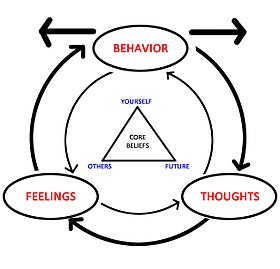Panic Disorder With Agoraphobia
by Vlasta Kuster
Not every person who experiences a panic attack has a panic disorder, while people who have reoccurring panic attacks are more likely to suffer from panic disorder.
Some people who suffer from agoraphobia experience panic attacks, while others who have the symptoms of agoraphobia have no history of panic attacks.
When are we talking about panic disorder with agoraphobia ?
Even that panic disorder and agoraphobia are two separate psychiatric disorders, they often occur together.
Panic disorder is an anxiety disorder characterized by reoccurring unexpected panic attacks.
When panic disorder develops, it usually becomes a cycle of fear.
The cycle begins with advance anxiety about where, when and how the next panic attack may occur.
A person who suffers from a panic disorder, experience sudden attacks of intense and overwhelming fear that something terrible is going to happen.
'The world agoraphobia literally means “fear of wide, open spaces”.'
The world agoraphobia literally means “fear of wide, open spaces”.
Agoraphobia is a fear of being in situations where escape might be difficult or that help wouldn't be available if something would go wrong.
Agoraphobia is a type of anxiety disorder
in which an individual’s fear of places and situations can cause him to
panic and make him feel trapped, helpless or embarrassed.
Many people think that agoraphobia is simply a fear of open spaces, but it’s more complex condition.
Agoraphobia usually develops as a complication of the following elements:
- panic
disorder,
- an anxiety disorder involving panic attacks
- and moments of intense fear.
In this case we are talking about panic disorder with agoraphobia.
One
the other hand, there is a minority of people who are suffering from
agoraphobia without experiencing panic attacks, and their fear may be
related to issues like a fear of illness, crime, terrorism or being in
an accident.
An individual with agoraphobia exhibits high levels
of fear and anxiety which are connected to at least two of the following
situations, for at least six months or longer:
- using public transport, such as bus, train, plane;
- being in open spaces, such as parks or on bridges;
- being in closed places such as theaters, elevators or stores;
- being in crowd or standing in line;
- being outside of home alone.
"The causes for developing agoraphobia are very similar to the causes of panic disorder"
In a stressful situation a person with agoraphobia usually experience the symptoms of a panic attack, such as:
- rapid heartbeat,
- rapid breathing,
- feeling hot and sweaty,
- trembling or tingling,
- a choking,
- chest pain,
- nausea or
- stomach discomfort, etc.
Due to a high levels of anxiety people with agoraphobia may try to avoid feared situations or activities and places where escape isn't easy if a panic attack occurs.
The causes for developing agoraphobia are very similar to the causes of panic disorder.
It is likely that genetic, biological, personality and environmental stressors all play role in the development of disorder.
Agoraphobia can begin in childhood, but usually starts in the late teen or early adult years, usually before age 35.
Women are diagnosed with agoraphobia more often than men are.
There are some risk factors for agoraphobia:
- suffering from panic disorder or other phobias;
- responding to panic attacks with excessive fear and avoidance;
- experiencing stressful life events (abuse, the death of somebody close, being attacked);
- having an anxious or nervous temperament;
- having a blood relative with agoraphobia;
Agoraphobia can seriously limit our life's activities such as we may not be even able to leave our home, go to school or work.
It can happen that we become dependent on others for help which means that some people may even be unable to do routine activities without the company of a “safe person” or they endure the situations with extreme anxiety.
Agoraphobia can also lead to or be associated with:
- depression;
- alcohol or drug abuse;
- other mental health disorders, including other anxiety disorders or personality disorders.
Agoraphobia can seriously limit someone’s ability to socialize or work and managing the details of their daily life.
Anxiety tends to increase the more we try to avoid situations that we fear.
Agoraphobia can make our world smaller. If you notice that you start to have mild fears about going to safe places, try to go there repeatedly before your fear becomes overwhelming.
If this is too hard to do on your own, it is advisable to ask someone you trust to go with you.
But if you feel anxiety going to some place or event or if you have already experienced any panic attack, in that case you must seek for a professional help.
Agoraphobia can also lead to or be associated with:
- depression;
- alcohol or drug abuse;
- other mental health disorders, including other anxiety disorders or personality disorders.
Agoraphobia can seriously limit someone’s ability to socialize or work and managing the details of their daily life.
Anxiety tends to increase the more we try to avoid situations that we fear. Agoraphobia can make our world smaller.
If you notice that you start to have mild fears about going to safe places, try to go there repeatedly before your fear becomes overwhelming.
If this is too hard to do on your own, it is advisable to ask someone you trust to go with you.
But if you feel anxiety going to some place or event or if you have already experienced any panic attack, in that case you must seek for a professional help.
Sources:
https://www.betterhealth.vic.gov.au/health/ConditionsAndTreatments/panic-disorder-and-agoraphobia
https://www.healthline.com/health/panic-disorder-with-agoraphobia
https://www.mayoclinic.org/diseases-conditions/agoraphobia/symptoms-causes/syc-20355987
https://www.aafp.org/afp/1998/0515/p2419.html
https://www.mirecc.va.gov/visn22/panic_and_agoraphobia.pdf
https://www.nhs.uk/conditions/agoraphobia/
Vlasta Kuster, holds an MA degree in Basic Medical Sciences and uses her 3-month EFT therapy in her work to help people to do away with panic attacks and anxiety for good. She has more than 10-year experiences in EFT therapy and achieves at least 90% success in permanently eliminating anxiety and panic attacks. You may contact her through her website freeofpanic.com


